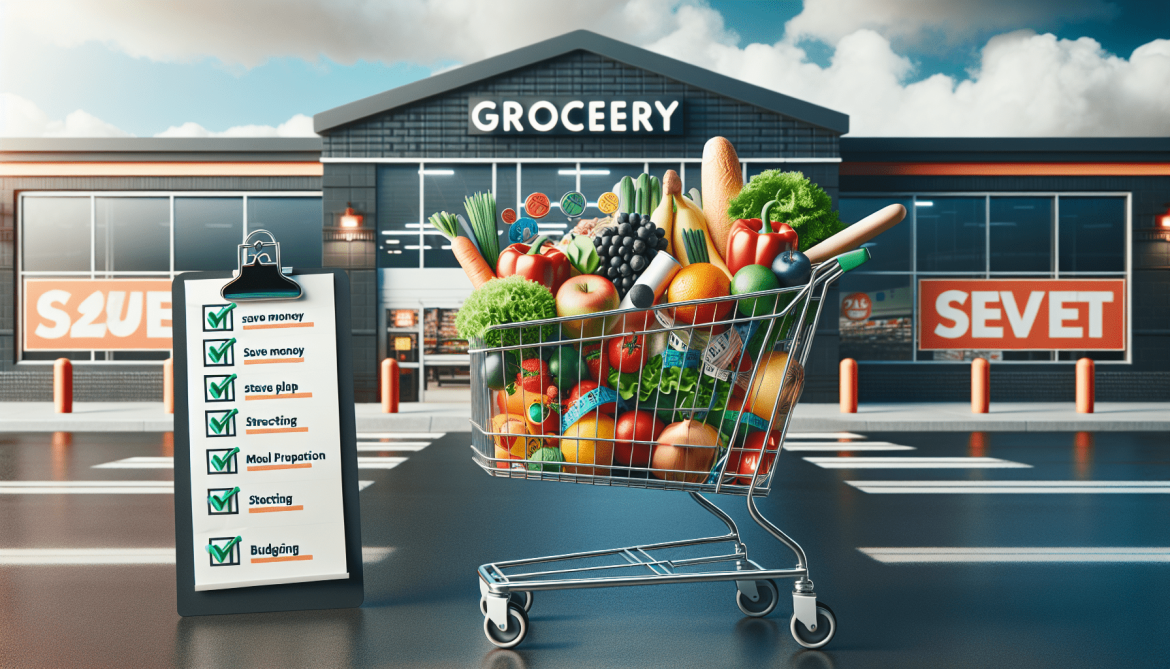Looking to save some extra cash on your monthly grocery bill? Look no further! This article will provide you with a range of budgeting hacks to help lower your monthly grocery expenses. From smart shopping strategies to meal planning tips, you'll discover simple and effective ways to stretch your dollar at the supermarket. Don't let your hard-earned money go to waste – read on to find out how you can cut down on your grocery expenses without compromising on quality or taste.
Meal planning
Meal planning is a crucial step in managing your grocery expenses. By planning your meals in advance, you can avoid impulse purchases and ensure that you only buy what you need. Start by creating a weekly or monthly meal plan, taking into account your dietary preferences, any special occasions, and the ingredients you already have at home. This will help you stay organized and save money by minimizing food waste.
Once you have your meal plan, it's time to create a grocery list. This step is essential to avoid overspending and buying items you don't really need. Take a few minutes to go through each recipe on your meal plan and write down the ingredients you need to buy. Be thorough and check your pantry and refrigerator to avoid duplicate purchases. By having a list, you can stay focused while shopping and resist the temptation of unnecessary items.
Now that you have your meal plan and grocery list, the next step is to stick to it. Avoid deviating from your list and buying items on impulse. Remember that every purchase can add up, and by sticking to your list, you'll be able to follow your budget more effectively. While it's okay to make slight adjustments if something is out of stock or on sale, try to resist the temptation of buying items that aren't on your list. Stick to the plan and watch your savings grow.
Couponing
Couponing is a popular way to save money on groceries. It's a simple and effective strategy that can result in significant savings over time. Start by collecting coupons from newspapers and magazines. Many Sunday newspapers include coupon inserts, and magazines often feature coupons for various products. Look out for manufacturer's coupons, as well as store-specific coupons.
Another option is to use online coupon websites. There are numerous websites that offer printable coupons and digital coupon codes for a wide range of products. Simply search for the items you need, select the coupons you want, and print them out or download them to your phone. These websites often have a wide selection of coupons to choose from, so you can easily find savings on the items you buy regularly.
Additionally, consider signing up for store loyalty programs. Many grocery stores offer loyalty cards or apps that provide additional discounts and exclusive deals for members. Take advantage of these programs by signing up and using them every time you shop. You may also receive personalized coupons based on your shopping habits, which can further reduce your expenses.
Buy in bulk
Buying in bulk can be a great way to save money on groceries, especially for nonperishable items. Purchasing items like rice, pasta, canned goods, and cleaning supplies in bulk can result in significant savings over time. Look for larger package sizes and compare the price per unit to determine the best value. Often, buying in bulk can cost less than buying individual items.
When it comes to meat, consider buying larger cuts. Purchasing whole chickens or larger cuts of beef and pork can be more cost-effective compared to buying individual portions. You can then portion and freeze the meat for future use. Just make sure to properly package and label the meat to maintain its quality.
Utilize bulk bins for grains and spices. Many grocery stores have bulk bins where you can scoop your desired amount of grains, nuts, spices, and other pantry staples. This allows you to buy only what you need and can help reduce food waste. Additionally, buying from the bulk bins often costs less than purchasing pre-packaged versions of the same items.
Shop seasonal and local
Shopping for fruits and vegetables that are in season can save you money while ensuring freshness and flavor. Seasonal produce is often more abundant and therefore priced lower compared to out-of-season items. Visit local farmers markets to find a variety of fresh produce at affordable prices. Not only will you support local farmers, but you'll also have access to seasonal fruits and vegetables that are at their peak.
Consider joining a community-supported agriculture (CSA) program. CSAs allow you to buy a share or subscription from local farms, providing you with a box of fresh produce each week or month. This not only supports local agriculture but also ensures that you're getting the freshest and most seasonal produce available. CSAs can be a cost-effective way to diversify your produce and support sustainable farming practices.
Compare prices
Before making a purchase, take the time to check prices at different stores. Prices can vary significantly between grocery stores, so it's worth comparing prices to ensure you're getting the best deal. Visit multiple stores in your area and make note of the prices for the items on your list. This will allow you to identify which stores offer the most competitive prices for the products you regularly buy.
In addition to physically visiting different stores, consider using price comparison websites and apps. These tools allow you to compare prices across multiple retailers without leaving your home. Simply enter the items on your grocery list, and the website or app will show you the prices at various stores. This can save you time and help you find the best prices without the need for extensive research.
It's also important to take note of store promotions and deals. Many stores offer weekly sales or discounts on certain items. Pay attention to flyers, emails, and digital platforms that advertise these promotions. By strategically timing your purchases to coincide with these deals, you can maximize your savings and reduce your grocery expenses.
Avoid convenience foods
Convenience foods, such as pre-packaged meals, frozen dinners, and snacks, can be convenient but expensive. These items often come with a premium price tag due to the added convenience factor. To save money, try to cook meals from scratch as much as possible. Not only will you have more control over the ingredients and flavors, but it can also be a fun and rewarding experience.
Preparing your own snacks can also help save money. Instead of buying individually packaged snacks, consider making your own at home. For example, you can make your own trail mix by combining nuts, dried fruits, and seeds. Similarly, you can bake your own granola bars or make your own popcorn for a healthier and more affordable snack option.
Limiting the purchase of pre-packaged and processed foods can have a significant impact on your grocery expenses. These items tend to cost more than their homemade counterparts, and they often contain additives and preservatives. By focusing on whole ingredients and cooking at home, you can save money while also improving the quality and nutritional value of your meals.

Use generic brands
One easy way to save money on groceries is to try store brands instead of name brands. Generic or store brands often cost less than their branded counterparts, but that doesn't mean they are of lower quality. In fact, many generic brands are comparable in taste and quality to their name brand counterparts.
When comparing products, take the time to compare the ingredients and nutritional information. Often, you'll find that the store brand and name brand products have very similar or even identical ingredient lists. Pay attention to quality seals and certifications to ensure that you're making an informed decision about the product's quality.
By opting for generic brands, you can take advantage of lower prices without compromising on taste or quality. Keep an open mind and give store brands a try – you may be pleasantly surprised by the savings and find new favorites along the way.
Utilize leftovers
Leftovers can be a goldmine when it comes to saving money on groceries. Instead of letting them go to waste, repurpose your leftovers into new meals. Get creative with ingredients and find ways to transform them into different dishes. For example, leftover roasted chicken can be turned into a chicken salad or used as a topping for pizzas or salads.
If you have larger quantities of leftovers, consider freezing them for future use. Invest in quality food storage containers or freezer bags to properly store and preserve your leftovers. Label and date the containers to keep track of what's inside and when it was frozen. This way, you can easily pull out a meal on busy days or when you need a quick and budget-friendly option.
Reducing food waste by utilizing leftovers not only saves you money but also helps reduce your environmental impact. By getting creative with your leftovers and incorporating them into your meal plans, you'll be able to stretch your grocery budget further and minimize waste.
Shop with a full stomach
Shopping on an empty stomach can be a recipe for disaster when it comes to sticking to your budget. When you're hungry, everything looks tempting, and you're more likely to make impulse purchases. Before heading to the grocery store, make sure you've had a meal or a snack to keep your hunger at bay.
By shopping with a full stomach, you'll be able to make more rational and mindful purchasing decisions. You'll be less likely to splurge on unnecessary items or give in to cravings that aren't on your list. Additionally, shopping when you're not hungry can help you stay focused and stick to your meal plan and grocery list.
Track your expenses
Keeping track of your grocery spending is essential to budgeting effectively. Make it a habit to record your grocery expenses, either manually or using budgeting apps or spreadsheets. This will allow you to see where your money is going and identify areas where you can make improvements.
When tracking your expenses, categorize them by type of food, brand, and store. This level of detail will help you analyze your spending patterns and identify opportunities to save. For example, you may notice that you're spending a significant portion of your grocery budget on high-end brands when there are more affordable alternatives available.
Budgeting apps and spreadsheets can streamline the process and provide you with an overview of your grocery spending. Many apps allow you to set spending limits or budgets for different categories, helping you stay on track. By tracking your expenses, you'll have a clearer picture of your grocery spending habits and be able to make informed decisions about where to cut back or make adjustments.



